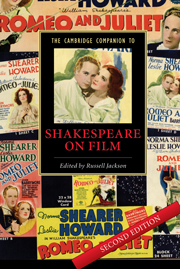Introduction: Shakespeare, films and the marketplace
Published online by Cambridge University Press: 28 July 2007
Summary
The romantic comedy Shakespeare in Love (1998) wittily puts the dramatist into the world of show business. Shakespeare’s relationship with the theatre manager, Henslowe - and through him with 'the money' - is the occasion for a multitude of jokes referring to the entertainment industry of late sixteenth-century London in terms of its equivalent four hundred years later. In one moment of crisis Henslowe is even on the point of giving birth to a great cliché. 'The show must …' he starts, and Shakespeare completes the phrase by urging him impatiently to 'Go on.' The moment passes, unnoticed by either of them. The tension between the artist and the marketplace has always been a good source of humour in drama and fiction and on film, and by situating a parody of it in Shakespeare’s time, the film probably makes it seem less harmful than it really is. The story is usually told in terms of the crassness of the producers and the crushed idealism of the 'creative' department. To quote Pauline Kael, 'There’s a natural war in Hollywood between the business men and the artists. It’s based on drives that may go deeper than politics or religion: on the need for status, and warring dreams.'
- Type
- Chapter
- Information
- The Cambridge Companion to Shakespeare on Film , pp. 1 - 12Publisher: Cambridge University PressPrint publication year: 2007

